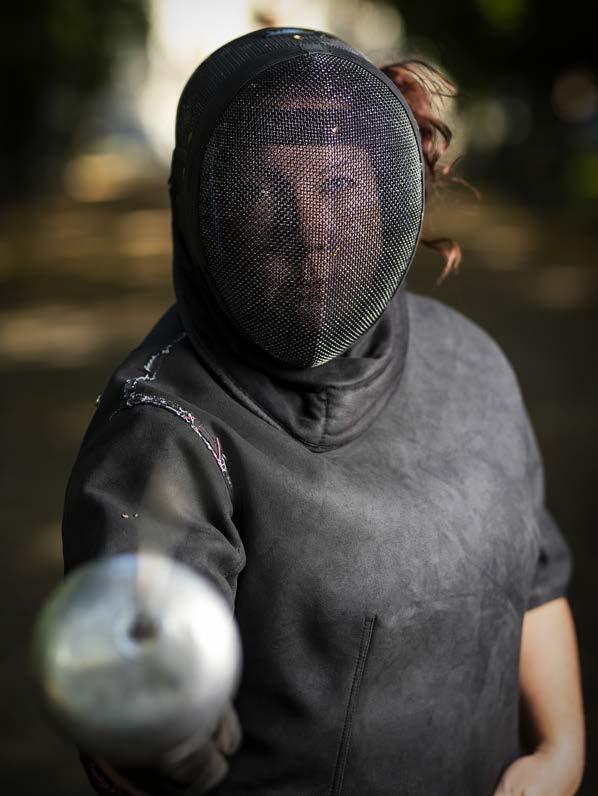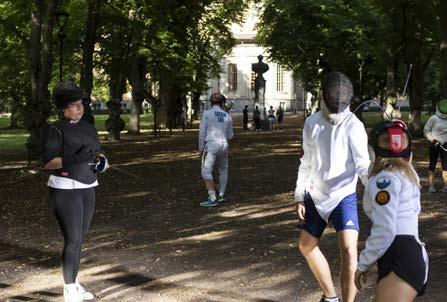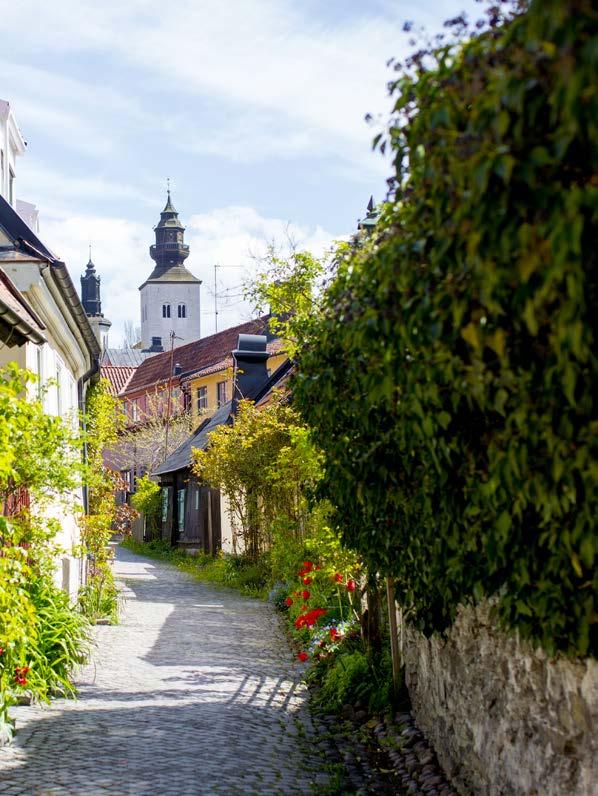
3 minute read
Not just for the nobs
Not
for just
Behind the University Library, a historic sport is being coached. Students have been fencing in Uppsala since the seventeenth century – and this spring and summer, training moved outdoors.
text ANNICA HULTH photo MIKAEL WALLERSTEDT
the nobs
LATE AFTERNOON IN Carolina Park. On the gravel between the University Library and the English Park Campus, members of Upsala Fencing Club are training. The theme of today’s training session is running technique and footwork and, as usual during summer 2020, training is taking place outdoors.
“We moved all training outside in March due to the corona pandemic. We train a couple of times a week,” says Sofie Larsson, the club’s head coach.
After a warm-up involving sprinting, lunges and squats, the group pulls on fencing jackets, masks and gloves. As coach, Larsson is dressed in black, while the others wear white clothing.
LARSSON TOOK UP fencing way back in 1994, at the tender age of nine. She is now a full-time coach.
“I enjoy the complexity. A good physique alone doesn’t make a good fencer, nor does a good brain. The technique is difficult; you need tactics but, at the same time, you need to be strong and fast. That’s why all fencers face different challenges, whether that be physical or psychological.”
Fencing has been taught at Uppsala University since 1663, when a royal decree required the University to teach the courtly exercises of riding, modern languages, fencing, music, dancing and drawing.
This knowledge was deemed beneficial to the noblemen who had begun to stream into the University to prepare for careers as diplomats, army officers or public officials. TO THIS DAY, there is a fencing master at Uppsala University, although the present incumbent of the post is currently abroad; however, the strongest link between Upsala Fencing Club and the University remains the large number of students among its members.
“We have approximately 100 members who train with varying frequency. They may attend anything from two to seven or eight sessions a week,” says Mattias Edlund, deputy chair of the club and an alumnus of the University, where he studied languages.
“The majority have been fencing since childhood and many remain in Uppsala as they are able to study here. This is an advantage for us and we also see fencers from other parts of the country moving to Uppsala to study.”
FENCING IS ABOUT speed, strength, fitness and coordination – but also mentality. It is a constant struggle to bamboozle and outsmart one’s opponent. Fencing demands hard training and a great deal of practice to develop a good technique.
Larsson instructs and demonstrates various patterns of movement together with Eriksson.
“Look at the tip. The tip should be ahead of the feet! Take short steps, braking from the left knee!”
The theme of today’s training session is running technique and footwork.
The group then splits into pairs, taking turns to thrust with épées. Probing, sweeping movements, sudden rapid lunges, a great deal of eye contact and intense interplay; fencing has similarities to dance.

FOR LARSSON THIS is a fulltime job, involving a great deal of travelling to competitions in various parts of the world. Unusually, a great deal of her time has been spent on home soil during 2020. She is currently preparing for the Swedish and Nordic Championships.
“There’s still a big question mark as to whether there will be any World Cup events or even an Olympics to dream of next season. But we won’t be wasting any time – we’ll be training in the parks of Uppsala.”
Fencing may be an individual sport, but training is very much a group activity.
“The great thing is that you can train together at different levels. We have various age categories, girls, boys and veterans. All of them can train together,” says Larsson.
In 2020, fencing isn’t simply a sport for noblemen preparing for a career.
Sofie took up fencing way back in 1994 at the tender age of nine. She is now a full-time coach.










